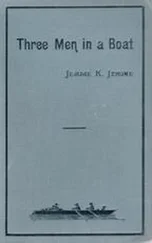Jerome Jerome - Three Men in a Boat (To Say Nothing of the Dog)
Здесь есть возможность читать онлайн «Jerome Jerome - Three Men in a Boat (To Say Nothing of the Dog)» — ознакомительный отрывок электронной книги совершенно бесплатно, а после прочтения отрывка купить полную версию. В некоторых случаях можно слушать аудио, скачать через торрент в формате fb2 и присутствует краткое содержание. Жанр: Юмористическая проза, Классическая проза, на английском языке. Описание произведения, (предисловие) а так же отзывы посетителей доступны на портале библиотеки ЛибКат.
- Название:Three Men in a Boat (To Say Nothing of the Dog)
- Автор:
- Жанр:
- Год:неизвестен
- ISBN:нет данных
- Рейтинг книги:3 / 5. Голосов: 1
-
Избранное:Добавить в избранное
- Отзывы:
-
Ваша оценка:
- 60
- 1
- 2
- 3
- 4
- 5
Three Men in a Boat (To Say Nothing of the Dog): краткое содержание, описание и аннотация
Предлагаем к чтению аннотацию, описание, краткое содержание или предисловие (зависит от того, что написал сам автор книги «Three Men in a Boat (To Say Nothing of the Dog)»). Если вы не нашли необходимую информацию о книге — напишите в комментариях, мы постараемся отыскать её.
Three Men in a Boat (To Say Nothing of the Dog) — читать онлайн ознакомительный отрывок
Ниже представлен текст книги, разбитый по страницам. Система сохранения места последней прочитанной страницы, позволяет с удобством читать онлайн бесплатно книгу «Three Men in a Boat (To Say Nothing of the Dog)», без необходимости каждый раз заново искать на чём Вы остановились. Поставьте закладку, и сможете в любой момент перейти на страницу, на которой закончили чтение.
Интервал:
Закладка:
I could not get a punt out that afternoon, they were all engaged; so I had nothing else to do but to sit down on the bank, watching the river, and waiting for my friends.
I had not been sitting there long before my attention became attracted to a man in a punt who, I noticed with some surprise, wore a jacket and cap exactly like mine. He was evidently a novice at punting, and his performance was most interesting. You never knew what was going to happen when he put the pole in; he evidently did not know himself. Sometimes he shot up stream and sometimes he shot down stream, and at other times he simply spun round and came up the other side of the pole. And with every result he seemed equally surprised and annoyed.
The people about the river began to get quite absorbed in him after a while, and to make bets with one another as to what would be the outcome of his next push.
In the course of time my friends arrived on the opposite bank, and they stopped and watched him too. His back was towards them, and they only saw his jacket and cap. From this they immediately jumped to the conclusion that it was I, their beloved companion, who was making an exhibition of himself, and their delight knew no bounds. They commenced to chaff him unmercifully.
I did not grasp their mistake at first, and I thought, "How rude of them to go on like that, with a perfect stranger, too!" But before I could call out and reprove them, the explanation of the matter occurred to me, and I withdrew behind a tree.
Oh, how they enjoyed themselves, ridiculing that young man! For five good minutes they stood there, shouting ribaldry at him, deriding him, mocking him, jeering at him. They peppered him with stale jokes, they even made a few new ones and threw at him. They hurled at him all the private family jokes belonging to our set, and which must have been perfectly unintelligible to him. And then, unable to stand their brutal jibes any longer, he turned round on them, and they saw his face!
I was glad to notice that they had sufficient decency left in them to look very foolish. They explained to him that they had thought he was some one they knew. They said they hoped he would not deem them capable of so insulting any one except a personal friend of their own.
Of course their having mistaken him for a friend excused it. I remember Harris telling me once of a bathing experience he had at Boulogne. He was swimming about there near the beach, when he felt himself suddenly seized by the neck from behind, and forcibly plunged under water. He struggled violently, but whoever had got hold of him seemed to be a perfect Hercules in strength, and all his efforts to escape were unavailing. He had given up kicking, and was trying to turn his thoughts upon solemn things, when his captor released him.
He regained his feet, and looked round for his would-be murderer. The assassin was standing close by him, laughing heartily, but the moment he caught sight of Harris's face, as it emerged from the water, he started back and seemed quite concerned.
"I really beg your pardon," he stammered confusedly, "but I took you for a friend of mine!"
Harris thought it was lucky for him the man had not mistaken him for a relation, or he would probably have been drowned outright.
Sailing is a thing that wants knowledge and practice too - though, as a boy, I did not think so. I had an idea it came natural to a body, like rounders and touch. I knew another boy who held this view likewise, and so, one windy day, we thought we would try the sport. We were stopping down at Yarmouth, and we decided we would go for a trip up the Yare. We hired a sailing boat at the yard by the bridge, and started off. "It's rather a rough day," said the man to us, as we put off: "better take in a reef and luff sharp when you get round the bend."
We said we would make a point of it, and left him with a cheery "Good- morning," wondering to ourselves how you "luffed," and where we were to get a "reef" from, and what we were to do with it when we had got it.
We rowed until we were out of sight of the town, and then, with a wide stretch of water in front of us, and the wind blowing a perfect hurricane across it, we felt that the time had come to commence operations.
Hector - I think that was his name - went on pulling while I unrolled the sail. It seemed a complicated job, but I accomplished it at length, and then came the question, which was the top end?
By a sort of natural instinct, we, of course, eventually decided that the bottom was the top, and set to work to fix it upside-down. But it was a long time before we could get it up, either that way or any other way. The impression on the mind of the sail seemed to be that we were playing at funerals, and that I was the corpse and itself was the winding-sheet.
When it found that this was not the idea, it hit me over the head with the boom, and refused to do anything.
"Wet it," said Hector; "drop it over and get it wet."
He said people in ships always wetted the sails before they put them up. So I wetted it; but that only made matters worse than they were before. A dry sail clinging to your legs and wrapping itself round your head is not pleasant, but, when the sail is sopping wet, it becomes quite vexing.
We did get the thing up at last, the two of us together. We fixed it, not exactly upside down - more sideways like - and we tied it up to the mast with the painter, which we cut off for the purpose.
That the boat did not upset I simply state as a fact. Why it did not upset I am unable to offer any reason. I have often thought about the matter since, but I have never succeeded in arriving at any satisfactory explanation of the phenomenon.
Possibly the result may have been brought about by the natural obstinacy of all things in this world. The boat may possibly have come to the conclusion, judging from a cursory view of our behaviour, that we had come out for a morning's suicide, and had thereupon determined to disappoint us. That is the only suggestion I can offer.
By clinging like grim death to the gunwale, we just managed to keep inside the boat, but it was exhausting work. Hector said that pirates and other seafaring people generally lashed the rudder to something or other, and hauled in the main top-jib, during severe squalls, and thought we ought to try to do something of the kind; but I was for letting her have her head to the wind.
As my advice was by far the easiest to follow, we ended by adopting it, and contrived to embrace the gunwale and give her her head.
The boat travelled up stream for about a mile at a pace I have never sailed at since, and don't want to again. Then, at a bend, she heeled over till half her sail was under water. Then she righted herself by a miracle and flew for a long low bank of soft mud.
That mud-bank saved us. The boat ploughed its way into the middle of it and then stuck. Finding that we were once more able to move according to our ideas, instead of being pitched and thrown about like peas in a bladder, we crept forward, and cut down the sail.
We had had enough sailing. We did not want to overdo the thing and get a surfeit of it. We had had a sail - a good all-round exciting, interesting sail - and now we thought we would have a row, just for a change like.
We took the sculls and tried to push the boat off the mud, and, in doing so, we broke one of the sculls. After that we proceeded with great caution, but they were a wretched old pair, and the second one cracked almost easier than the first, and left us helpless.
The mud stretched out for about a hundred yards in front of us, and behind us was the water. The only thing to be done was to sit and wait until someone came by.
It was not the sort of day to attract people out on the river, and it was three hours before a soul came in sight. It was an old fisherman who, with immense difficulty, at last rescued us, and we were towed back in an ignominious fashion to the boat-yard.
Читать дальшеИнтервал:
Закладка:
Похожие книги на «Three Men in a Boat (To Say Nothing of the Dog)»
Представляем Вашему вниманию похожие книги на «Three Men in a Boat (To Say Nothing of the Dog)» списком для выбора. Мы отобрали схожую по названию и смыслу литературу в надежде предоставить читателям больше вариантов отыскать новые, интересные, ещё непрочитанные произведения.
Обсуждение, отзывы о книге «Three Men in a Boat (To Say Nothing of the Dog)» и просто собственные мнения читателей. Оставьте ваши комментарии, напишите, что Вы думаете о произведении, его смысле или главных героях. Укажите что конкретно понравилось, а что нет, и почему Вы так считаете.












![Helen Rowland - The Widow [To Say Nothing of the Man]](/books/752764/helen-rowland-the-widow-to-say-nothing-of-the-man-thumb.webp)